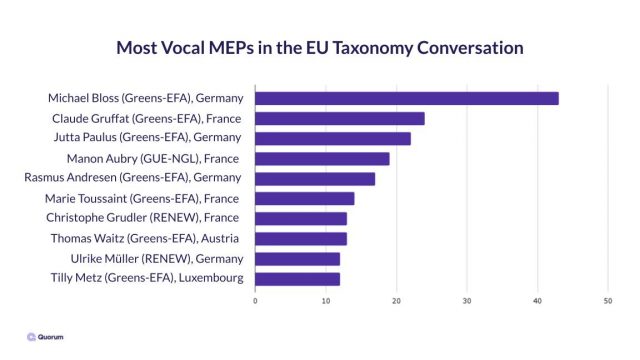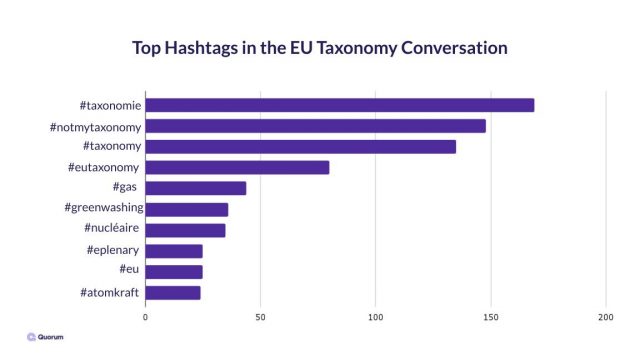The EU taxonomy for sustainable activities. It’s not necessarily a term that rolls off the tongue, but that hasn’t stopped a buoyant conversation on the taxonomy taking hold of the Brussels Bubble and beyond.
Debate reached new heights in recent weeks as policymakers addressed one of the most controversial questions around the taxonomy — whether gas and nuclear should be considered as sustainable activities to help the EU achieve its climate and energy goals for 2030. Following July’s plenary session where MEPs voted down a motion to oppose the inclusion of these energy sources, it’s now decided that investments in gas and nuclear can be labelled ‘green’, under certain conditions.
Navigating the evolution of the EU taxonomy can be tricky. So, in this blog, we’ll recap the basics — including what the taxonomy is and what it covers — before taking a deep dive into what MEPs have been saying on this salient topic.
EU Taxonomy — A Recap
What is the EU taxonomy?
First, let’s zoom out. What does EU taxonomy mean?
Put simply, the taxonomy is a way to classify climate-friendly economic activities. It was created because the European Commission saw the need to define what actually counts as ‘sustainable’, so that investments can be funnelled towards projects and activities that help the EU achieve its climate and energy goals.
The taxonomy was born out of the action plan on financing sustainable growth, itself part of the European Green Deal.
What sectors are covered by the EU taxonomy?
At present, the taxonomy focuses on sectors such as energy, manufacturing, transport, buildings, and agriculture, as these are expected to have the largest impact in hitting the EU’s environmental targets — but a greater variety of sectors can expect to be integrated over time.
Although the Taxonomy Regulation has been in force since 2020, its scope is evolving through a series of delegated acts which supplement — or will supplement — the initial piece of legislation.
That’s why gas and nuclear have been making the headlines recently. These energy sources are now specifically called out in the Complementary Climate Delegated Act to accelerate decarbonisation, which is what MEPs discussed in their July plenary session.
And in a nutshell, the debate centred around one key question…
Are gas and nuclear green?
The answer to this depends on who you talk to.
According to the European Commission, gas and nuclear both play a role as “transitional activities […] as stepping stones in the transition towards more renewables”. The Commission emphasises that this must be “in a limited number of circumstances and under strict conditions” as part of its “pragmatic and realistic approach” in supporting EU countries as they move towards climate neutrality.
It goes without saying that not everyone agrees with that position. Certain Member States have been particularly vocal in their disillusionment — for example, Austria. Following the Parliament’s vote, Austrian Climate Minister Leonore Gewessler took to Twitter to denounce the decision as “greenwashing” and stated that Austria will work with Luxembourg to bring legal action to the European Court of Justice.
And as for MEPs… Although a majority rejected the motion to oppose the inclusion of gas and nuclear in the EU taxonomy, a sizable portion — almost 40% — actually voted in favour. This number illustrates just how much Parliament’s opinion was divided on the matter. With that in mind, let’s take a deeper dive into what MEPs from across the spectrum had to say about the taxonomy.
Navigating Parliament’s Conversation on the EU Taxonomy
We examined what MEPs had to say about the taxonomy between 1 and 25 July 2022 in their plenary speeches, vote explanations, and social media activity (Facebook, YouTube, and Twitter — excluding retweets). See the breakdown below.
Greens-EFA Lead the Most Vocal Officials — with French and German MEPs Heavily Represented

Seven of the ten officials who contributed most to July’s taxonomy conversation are from Greens-EFA — as can be expected, given the group’s focus on climate and environmental protection. Michael Bloss (Greens-EFA, Germany) takes the top spot as the most vocal official, which correlates with his involvement in tabling the motion that MEPs debated in July.
The dominance of French and German politicians in the top ten is closely reflective of the place of gas and nuclear within their domestic political contexts. France as a Member State relies heavily on nuclear energy and has therefore supported its inclusion in the taxonomy — a stance which Greens-EFA strongly opposes. In Germany, where 55% of gas imports currently come from Russia, concerns around energy security loom large in the context of Russia’s invasion of Ukraine. As such, the national political conversation is likely to drive up engagement on the subject of gas among German MEPs.
Gas Dominates the Debate; Nuclear Trails Behind
The heavy emphasis on gas was not limited to German MEPs, though. The term “gas” appeared 307 times in the broader taxonomy conversation, compared to 160 mentions of “nuclear”.
This indicates how gas has sharply risen up the European political agenda in recent weeks and months. Reduced flows of Russian gas are currently reaching the EU, which has led the bloc to prepare for energy cuts and rationing this winter, while the EU has also announced its intention to end dependence on Russian fossil fuels by 2027.
#NotMyTaxonomy and #Greenwashing Among Top-Used Hashtags
The most-used hashtags in MEPs’ social media output serve as a further reflection of the contentious nature of the taxonomy debate.

MEPs who opposed the inclusion of gas and nuclear in the EU taxonomy turned to hashtags such as #greenwashing and #notmytaxonomy to voice their discontent — with the latter being used 148 times.
Wrapping Up on Gas, Nuclear, and the Taxonomy
The place of gas and nuclear within the EU taxonomy has been the subject of significant debate. However, since Parliament and the Council of the EU did not object, the Complementary Climate Delegated Act has now been published in the Official Journal and will apply from 1 January 2023.
Otherwise, EU countries recently signed off on plans to reduce gas demand in a bid to safeguard supplies this winter — and the green transition remains a key priority for the Von der Leyen Commission. All in all, it’s clear that gas and nuclear are set to remain high up the European policy agenda for months and years to come.